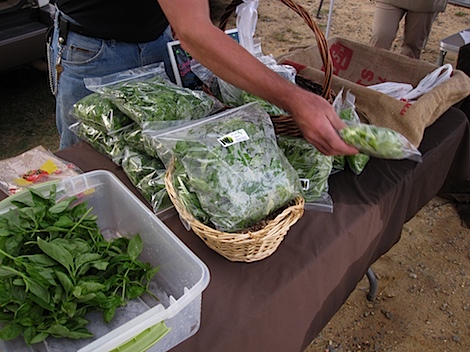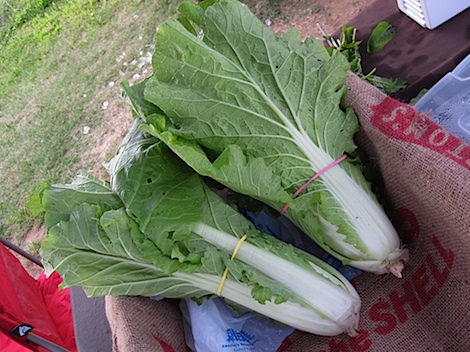Continuing our Meatless for Lent guest post series is Kristen of Eating RD with a fabulous and informative article on tips for vegetarians.
Take it away Kristen!
————————————————-
Vegetarian Tips
Hello TCL readers! I was excited when Diana asked me to do a guest post on becoming vegetarian. I myself am what you could call ‘flexitarian’, and really enjoy including plant-based meals in our family’s weekly menu. I hope you enjoy the information!
Becoming vegetarian has been shown to offer many health benefits and even many popular athletes, like six-time Ironman champion Dave Scott and NFL’s Tony Gonzalez power through their intense training with a vegetarian-based diet.
There are many reasons one may wish to become vegetarian, including ethical and environmental concerns, health concerns, or religious beliefs, which are all justifiable in their own right. There are also many beneficial reasons to become vegetarian. In 2009, the American Dietetic Association (ADA) approved vegetarian diets for sports performance in their position statement (http://www.scandpg.org/files/2010/PP_NutritionAthleticPerformance.pdf). Vegetarian diets are rich in fiber and moderate in fat and protein. They are also full of colorful plant-based phytochemicals and antioxidants which have shown numerous health benefits.
In general vegetarian diets can provide:
• Weight control: Veggies, whole grains and beans are high in fiber and generally lower in calories, which can keep us fuller and satisfied while eating less.
• Antioxidants: Plant-based foods are packed with antioxidants like vitamins A, C, and E, which can help boost the immune system, enhance athletic recovery, and provide anti-aging properties.
• Lower disease risk: Increasing veggies can help reduce one’s risk for type 2 diabetes and provide digestive advantages to prevent colon cancer and keep those bowels functioning properly.
There are several different types of vegetarians, based on the preference and beliefs of the individual:
• Vegans exclude all meat-based products like dairy, eggs, honey and gelatin. These individuals are at a higher risk for deficiencies if the diet isn’t well-planned.
• Lacto-vegetarians include eggs and dairy into the diet.
• Pesco-vegetarians eat fish and other seafood, but no meat and may or may not include dairy and eggs.
• Flexitarians typically eat meat on occasion, usually excluding red meat.
Even though there are a great amount of advantages to a vegetarian-based diet, there can be some concerns with certain nutrients if one is not careful to get a variety of plant-based foods in the diet over time. Vegetarian athletes have to be particularly concerned with adequate energy intake. It’s also not a bad idea to have a blood test done to make sure one has adequate levels, especially if you are very athletic and active. MicroNutrient Testing (http://www.spectracell.com/mnt/) is one example of a comprehensive, in-depth test to make sure you are getting the nutrients you need.
Below is a table of common nutrients to watch out for:
| Nutrient | Function | Veggie Sources |
| Zinc | Immune system, protein synthesis, CHO met, blood formation | Legumes, whole grains, nuts, seeds, soy, dairy, fortified foods |
| Iron | Hemoglobin synthesis, transporting Oxygen (athletes are at particular risk) | Fortified cereals, legumes, beans, soy nuts, tofu, dried fruit, green leafy veggies *combine w/ Vit C for better absorption* |
| Vitamin B12 | Met of nerve tissue, protein, CHO and fats | Diary, eggs, fortified soy milk, sports bars, supplements |
| Vitamin D | Bone growth, absorption of calcium, nervous system/heart fxn, regulation of inflammatory responses | Dairy, eggs, fortified soy products |
| Riboflavin (B2) | Energy production and storage in muscles | Dairy, soy milk, yogurt, cheese, fortified cereals, grains, textured vegetable protein |
| Calcium | Nerve transmission, contraction, Vit D metabolism, bone growth | Dairy, fortified soy milk & OJ, tofu, yogurt, broccoli, kale, tahini, almonds |
| Essential Fatty Acids | Energy, hormone production, absorption of fat-soluble Vitamins (A,D,E,K) | Soy, walnuts, flax, nuts, canola oil, algae-based omega supplements |
What about protein? Getting enough protein in the diet is completely doable with plant-based protein like beans, tofu, nuts, and dairy substitutes like soy milk. There are even brown rice, hemp and pea protein supplements that can be used for convenience. It is advisable for vegetarians to eat 10% more than the standard recommendation because plant-based sources of protein aren’t quite as bioavailable as animal-based. Variety is key and it’s important to include an assortment of essential amino acids. I’m a huge fan of quinoa because it is a ‘complete protein’, meaning it contains all the essentials, plus it’s pretty quick to cook and very versatile.
Here are some simple tips to becoming vegetarian:
• Review your current diet. Make a list of foods that you regularly eat. Pay special attention to vegetarian foods that you already like.
• Choose a variety of plant-based foods. Aim for an eating plan that includes many types of whole grains, fruits, vegetables, and beans.
• Add vegetables to meals you already enjoy. For example, if you already eat pasta with tomato sauce, try adding more vegetables to this dish.
• Try plant-based meat substitutes. Choices include textured vegetable proteins made from soybeans, wheat proteins, and other vegetable sources. Many look and taste like regular meat products. Check your grocer’s freezer department for vegetarian “hamburger,” “sau¬sage,” “chicken,” and “bacon.” These are good in dishes such as chili or casseroles.
• Use dairy substitutes. Choices include plain and flavored soymilk, tofu, and soy cheese. You can use soymilk on cereal and in coffee. Nondairy cheese tastes good on pizza and sandwiches.
• Look for vegetarian ethnic foods. Many ethnic food stores and restaurants offer tasty vegetarian foods full of flavor and aromatic spices.
• Explore the supermarket. You may find new ingredients and ready-to-eat vegetarian foods from around the world. I always love going to the bin aisle and picking up several different grains or beans to take home and experiment with!
• Read recipes. Hundreds of vegetarian cookbooks are available. Many have recipes from regional cuisines that can expand your options. Many recipes can also be easy switched to vegetarian with simple substitutions.
• Become a label reader. Labels offer valuable information about ingredients and nutrients. Just because something is vegetarian and/or vegan doesn’t mean it is super healthy.
• Avoid the fat trap. Many vegetarian-based dishes can be loaded with creamy sauces or fried. Plan your meals around whole grain cereals, fruits, vegetables, and beans. Plant foods that are high in fat (such as avocados, nuts, coconuts, olives, and oils from plants and seeds) are also high in calories. Enjoy them in moderation.
In the spirit of vegetarian cooking, I’d like to share a recipe that we really enjoy that is packed with nutrients called Lentil-Quinoa Stuffed Kabocha. (here is the link– http://eatingrd.com/recipes-3/lentil-quinoa-stuffed-kabocha/) you can just copy/save pictures or format how you like ☺
Be sure to check out my recipe page (http://eatingrd.com/recipes-3/) for other vegetarian meal ideas (* = vegetarian)
I’ve tried to cover the general bases, but let me know if you have any other questions!
Resources
American Dietetic Association http://www.eatright.org (Click Find a Registered Dietitian to locate a Registered Dietitian in your area.)
The Vegetarian Resource Group http://www.vrg.org
Vegan/Vegetarian Recipes and More for the Vegan Diet and Lifestyle http://www.vegweb.com
Vegan and Vegetarian Recipes, Articles, Health Resource http://www.vegsource.com
Vegetarianism and Vegetarian Nutrition http://www.vegetarian-nutrition.info
Savvy Vegetarian http://www.savvyvegetarian.com
Vegetarian and Vegan Information http://www.goveg.com
Deva Nutrition has a variety of Vegan/Vegetarian supplements including algae-based omega-3s http://www.devanutrition.com/vegan_DHA.html
————————————————-
Thank you so much Kristen for that detailed article! I need to re-read that one a couple times, myself! 🙂
If you’d like to check out the other Meatless 4 Lent guest posters, click here.



Great info 🙂 Thanks!
Thanks again for asking me, there is so much good info to share! Have a great weekend Diana 🙂
Thank YOU! 🙂